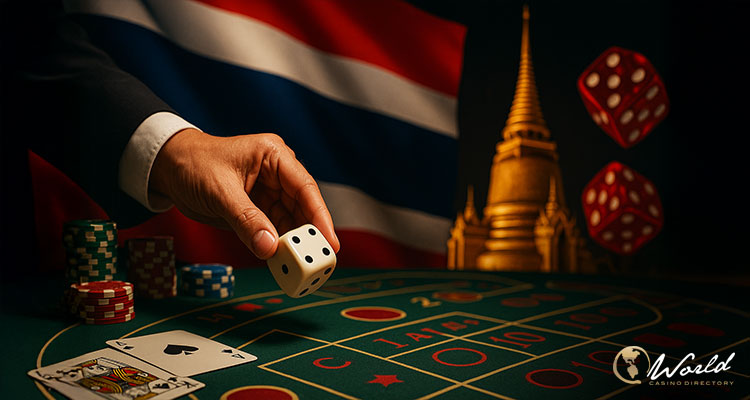Thailand stands at a crucial crossroads as global experts and economists advocate for the legalization of casino resorts, suggesting that the kingdom could significantly enhance its tourism appeal and economic dynamism through well-regulated entertainment complexes.
Bo Bernhard, Vice President of Economic Development at the University of Nevada, Las Vegas, recently visited Bangkok to meet with political leaders and economic scholars, aiming to promote the idea of establishing integrated resorts in Thailand. Drawing from Singapore’s transformation in the early 2000s, Bernhard recalled a conversation with a Singapore Tourism Board member who once lamented the country being “a little bit boring.” Since then, Singapore has evolved into a vibrant hub for tourism with developments like Marina Bay Sands and Resorts World Sentosa, which have played a pivotal role in increasing both visitor numbers and the length of their stays.
Bangkok’s Potential to Eclipse Singapore
Bernhard argued that Bangkok, with its robust infrastructure and international airport, has the potential to outshine Singapore if it develops two world-class integrated resorts. “Bangkok has a critical mass of infrastructure. It has a world class airport. Bangkok alone, with two resorts, can surpass Singapore and become one of the largest gaming destinations in Asia,” he said, according to Bangkok Post.
The push aligns with the Pheu Thai Party’s proposal for a large-scale entertainment complex, a key part of its economic strategy. While the project is still under debate, it envisions a multifaceted resort featuring a theme park, shopping center, hotel, convention hall, concert venue, and a casino that occupies no more than 10% of the total space. Thai nationals would be required to meet stringent financial criteria to access the gaming areas, including holding a deposit of 50 million baht for six months.
Legislation Faces Resistance Amid Concerns
Despite the potential economic benefits, the proposal has sparked considerable opposition. The draft casino bill, introduced in early April, faced backlash for its perceived haste, prompting the government to delay its parliamentary reading. Critics, including opposition MP Rangsiman Rome, have raised alarms about the risks of crime and corruption, citing precedents in Myanmar, Laos, and Cambodia, where poorly regulated casinos have been linked to illicit activities such as money laundering and human trafficking.
Rome questioned what safeguards would be put in place to prevent similar outcomes. “Criminals run amok and crimes like money laundering and human trafficking have flourished,” he warned, referencing notorious venues like Shwe Kokko and Dara Sakor.
Bernhard emphasized that top-tier gaming operators favor markets with robust oversight. “The serious operators think Thailand is interesting and attractive. Serious operators want the strengthening of law,” he said. These companies, he added, require clear anti-money laundering protocols and strong enforcement mechanisms to ensure clean, transparent operations. “They want to watch the dollars legimately spent, counted and taxed, to make sure it’s clean. The enforcement must be strict.”
Economic Incentives and the Road Ahead
Economist Narongchai Yaisawang echoed Bernhard’s sentiments, pointing out that while Thailand welcomed 40 million international visitors in 2019, comparable to Las Vegas, spending per tourist remains low. In Las Vegas, a visitor typically spends between $2,000 and $5,000, primarily on the Strip’s 25–30 mega resorts. In contrast, Thailand’s average tourist expenditure is significantly lower, indicating room for growth should the country invest in high-end entertainment infrastructure.
Integrated resorts, Bernhard explained, function as more than just gambling venues. The casino element is often minimal, while the broader development acts as a magnet for families, business travelers, and leisure tourists. Companies like MGM Resorts International and Las Vegas Sands use differing strategies to attract various customer segments, from business tourism to sports entertainment. “These companies need to diversify their portfolios. For example, if one revenue stream gets hit in Macau, there’s still Bangkok, and that’s a business strength,” Bernhard noted.
He believes the next few decades will be transformative for the global tourism and entertainment industries. “This is the first time in history when more than 50% of the global population are middle class or above. In 10 years, two-thirds will be middle class,” he said. “In the next 50 years, that number’s only going up, and if Thailand becomes stagnant it will lose out in the face of regional competition especially when we talk about the new wave of wealth emanating from Guangzhou or India.”
As regional rivals race to capture a greater share of the lucrative tourism economy, Thailand’s decision on casino legalization could determine whether it remains a premier destination or falls behind in the evolving landscape of global travel.



